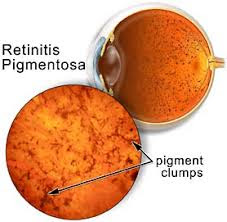The retina lines the interior surface of the back of the eye. The retina is made up of several layers. One layer contains two types of photoreceptor cells referred to as the rods and cones. The cones are responsible for sharp, central vision and color vision and are primarily located in a small area of the retina called the fovea. The area surrounding the fovea contains the rods, which are necessary for peripheral vision and night vision. The number of rods increases in the periphery. The rod and cone photoreceptors convert light into electrical impulses and send the message to the brain via the optic nerve. Another layer of the retina is called the retinal pigmented epithelium. In RP, the photoreceptors begin to deteriorate and lose their ability to function. Because the rods are primarily affected, it becomes harder to see in dim light, thus causing a loss of night vision. As the condition worsens, peripheral vision disappears, which results in tunnel vision. The ability to see color is eventually lost. In the late stages of the disease, there is only a small area of central vision remaining.

































